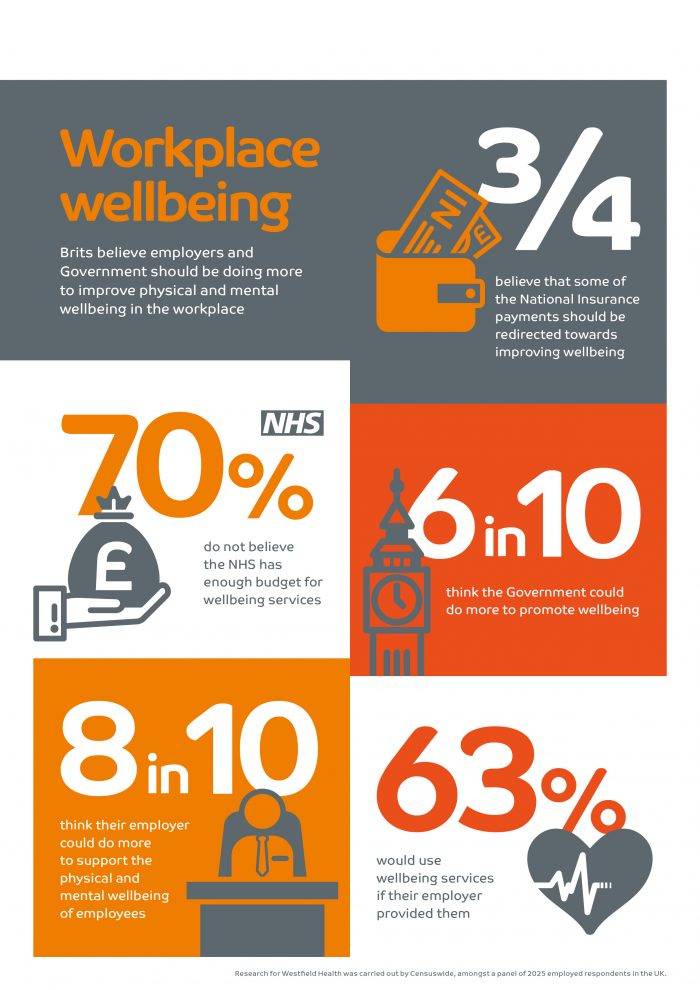April 17, 2018
Majority of staff say employers must do more to support their physical and mental wellbeing
 More than half of working adults believe that UK businesses are not doing enough to support the physical and mental wellbeing of their employees. The vast majority (86 percent) believe that firms are specifically not doing enough to help employees deal with work-related stress, anxiety and other mental health issues. And with seven out of 10 of those surveyed by Westfield Health saying that the NHS does not have the budget to provide wellbeing services, such as health check-ups and cognitive behavioural therapy, almost three quarters agreed it would be a good idea for a portion of their National Insurance contributions to be redirected towards employee wellbeing programmes.
More than half of working adults believe that UK businesses are not doing enough to support the physical and mental wellbeing of their employees. The vast majority (86 percent) believe that firms are specifically not doing enough to help employees deal with work-related stress, anxiety and other mental health issues. And with seven out of 10 of those surveyed by Westfield Health saying that the NHS does not have the budget to provide wellbeing services, such as health check-ups and cognitive behavioural therapy, almost three quarters agreed it would be a good idea for a portion of their National Insurance contributions to be redirected towards employee wellbeing programmes.
Currently 12 percent of the average salary (£157-£866 per week) goes towards National Insurance. A government-backed auto-enrolment scheme for wellbeing programmes – funded by employers and by a portion of employees’ National Insurance contributions – is just one of the ideas that could form part of a revamped funding plan for the NHS to address its long-term financial needs. The research found that six in 10 would like to see the Government do more to promote the physical and mental health of Britain’s workforce.
Commercial Director of Westfield Health, David Capper, said: “With the financial pressures of a growing and ageing population, alongside rising public expectations of the level of care they receive, the NHS is under greater strain than ever before. And, with the cost of presenteeism being so vast for UK businesses, doesn’t it make sense for employers to relieve some of the pressure though wellbeing initiatives?”
 A recent Deloitte report found that presenteeism could account for a greater loss of productivity than sickness absence itself. It is estimated that presenteeism is costing businesses up to three times more than absenteeism, approximately £16.8bn – £26.4bn per year. The total number of UK working days lost to stress, anxiety and depression resulting from long working hours is 12.5million days.
A recent Deloitte report found that presenteeism could account for a greater loss of productivity than sickness absence itself. It is estimated that presenteeism is costing businesses up to three times more than absenteeism, approximately £16.8bn – £26.4bn per year. The total number of UK working days lost to stress, anxiety and depression resulting from long working hours is 12.5million days.
Capper, continued: “It was recently reported that Britain’s productivity is 16 percent behind the other G7 nations. With Brexit just around the corner, it’s time to ask the question what part could a healthy, happy workforce play in helping UK businesses close this gap on productivity?
“From sleep to nutrition and mental health to physical fitness, there are so many elements that contribute to your overall wellness, happiness and healthiness. It’s more than free fruit in the office and discounted gym memberships. As business leaders, we need to create a culture where our people’s health and wellbeing is prioritised to drive confidence, capability, inspiration and ultimately prosperity.”
Dr Anouska Carter, Principal Researcher at AWRC (Advanced Wellbeing Research Centre) at Sheffield Hallam University, said: “Poor lifestyle choices in an aging population is crippling the NHS, due to an increased incidence of such conditions as type 2 diabetes, heart disease and some cancers. The prevention of chronic disease and maintenance of good health, require complex lifestyle behaviour change interventions that are based on sound scientific principles.”
“There is an urgent need for a new approach to stem the rapid increase in chronic disease. Workplaces have the opportunity to offer the ideal setting for a preventative approach to health and wellbeing, with adults spending most of their waking hours at work.”
“The right working environment and approach to helping employees lead a healthy and active lifestyle can benefit not only the employees and the businesses that they work for, but also their families, which will relieve pressure on the NHS, helping it to focus on doing what it does best.”














